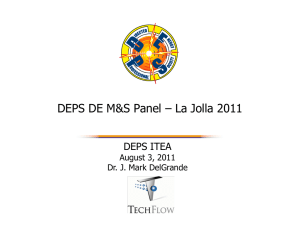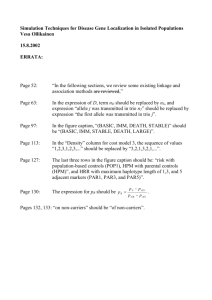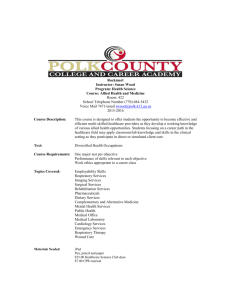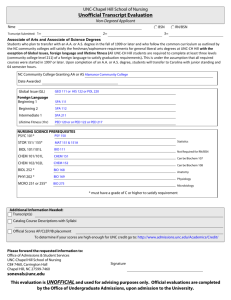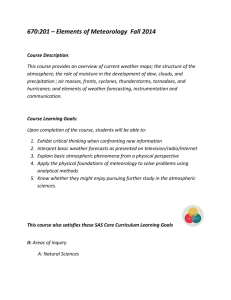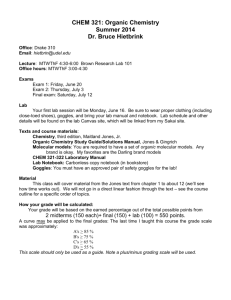HPM 746 Introduction to Financial and Managerial Accounting for
advertisement
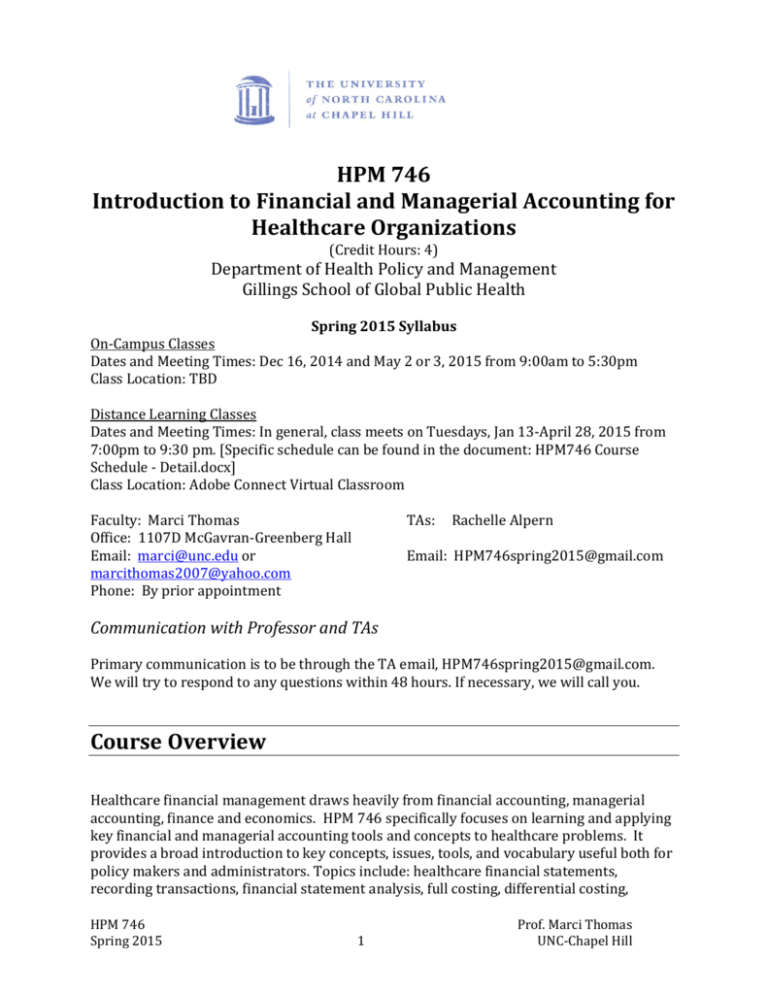
HPM 746 Introduction to Financial and Managerial Accounting for Healthcare Organizations (Credit Hours: 4) Department of Health Policy and Management Gillings School of Global Public Health Spring 2015 Syllabus On-Campus Classes Dates and Meeting Times: Dec 16, 2014 and May 2 or 3, 2015 from 9:00am to 5:30pm Class Location: TBD Distance Learning Classes Dates and Meeting Times: In general, class meets on Tuesdays, Jan 13-April 28, 2015 from 7:00pm to 9:30 pm. [Specific schedule can be found in the document: HPM746 Course Schedule - Detail.docx] Class Location: Adobe Connect Virtual Classroom Faculty: Marci Thomas Office: 1107D McGavran-Greenberg Hall Email: marci@unc.edu or marcithomas2007@yahoo.com Phone: By prior appointment TAs: Rachelle Alpern Email: HPM746spring2015@gmail.com Communication with Professor and TAs Primary communication is to be through the TA email, HPM746spring2015@gmail.com. We will try to respond to any questions within 48 hours. If necessary, we will call you. Course Overview Healthcare financial management draws heavily from financial accounting, managerial accounting, finance and economics. HPM 746 specifically focuses on learning and applying key financial and managerial accounting tools and concepts to healthcare problems. It provides a broad introduction to key concepts, issues, tools, and vocabulary useful both for policy makers and administrators. Topics include: healthcare financial statements, recording transactions, financial statement analysis, full costing, differential costing, HPM 746 Spring 2015 1 Prof. Marci Thomas UNC-Chapel Hill budgeting, and responsibility accounting. The course uses a number of cases and focuses upon both analytics and communication skills. Although we will touch on these topics, a more robust discussion of healthcare financial management topics such as reimbursement, the time value of money and financing the organization are found in other courses in the curriculum. Learning Objectives and HPM Competencies Course Learning Objective 1. Identify, define and discuss key healthcare management accounting concepts. 2. Apply fundamental healthcare financial and management accounting skills and knowledge. 3. Prepare and present financial models on electronic spreadsheets and PowerPoint slides in a clear, succinct and logical manner. 4. Achieve Objectives #2 and 3, in part, by working effectively in a team of fellow students. Competencies Financial Skills Financial Skills, Analytical Thinking, Performance Measurement Financial Skills, Analytical Thinking, Communication Skills Professionalism, Team Dynamics Accountability Specific Skills and Tools 1. Apply the concepts of accrual accounting in analyzing the effects of management’s actions on healthcare financial statements. 2. Read and analyze healthcare financial statements. 3. Calculate fully allocated costs and use the tools and concepts of full costing in setting rates. 4. Calculate contribution margin, product margin and net income and apply the tools and concepts of differential costing to both a drop-add and a bundled pricing situation. 5. Prepare cash, capital and operational budgets and identify tradeoffs in making resource allocation decisions. 6. Use responsibility accounting tools and concepts in measuring divisional performance and apply key responsibility accounting tools and concepts in analyzing organizational change. 7. Prepare and present financial models on electronic spreadsheets and PowerPoint slides in a clear, succinct and logical manner. HPM 746 Spring 2015 2 Prof. Marci Thomas UNC-Chapel Hill 8. Achieve these objectives, in part, by working effectively in a team of fellow students. Resources Website HPM 746 has its own website using Sakai software. (See http://sakai.unc.edu) This syllabus is on the website. Text and Readings Required: 1. The course textbook: William N. Zelman, Michael J. McCue, Noah D. Glick and Marci Thomas. Financial Management of Health Care Organizations, 4rd Edition, JosseyBass, 2015. ISBN-978-1-118-46656-8; ISBN-978-1-118-46659-9. 2. A course pack with all of the cases you will need can be found at https://cb.hbsp.harvard.edu/cbmp/access/31411254 . You will need to use this link to get the discounted student rate. 3. Excerpts from David Young’s Book, Management Accounting in Health Care Organizations will be made available electronic, courtesy of our UNC Library. A link will be posted on Sakai. Suggested Reference Material: 1. A basic proficiency in financial accounting is required [Accounting Proficiency Assessment 2 due 1/13]. You may learn this material any way you like, however in the past, students have found the following materials very helpful. a. Robert N. Anthony and Leslie K. Breitner, Essentials of Accounting, 9th Edition or later. Prentice Hall (ISBN: 9780131496934). b. An online, interactive instructional course available through AMElearning. It can be found at www.AMElearning.com. This resource was popular with last year’s class. It includes an eText, all the tutorials, endless practice questions, PPTs, etc. To purchase access to this course follow these steps: i. Go to www.amelearning.com ii. Click on Store iii. Click on Financial Accounting Principles – Unique PIN Number iv. Add it to the cart and pay $72. This will provide you with a PIN to be used when registering. Please use this enrollment key when registering: fall2013unc HPM 746 Spring 2015 3 Prof. Marci Thomas UNC-Chapel Hill c. Khan Academy - A free online resource with video instruction, assessment, and other learning tools. https://www.khanacademy.org/economicsfinance-domain/core-finance/accounting-and-financial-stateme d. Lynda – Online resource offering video tutorials, one month membership $25/month. http://www.lynda.com/ 2. A very useful resource and primer on health care finance for executives can also be found at the following link. This document was created by Felix Kaufman, Ph.D, CPA. academics.ochsner.org/uploadedFiles/Education/Library/Portals/F5.pdf Articles Any required articles or other materials for the course for which URLs are available will be added to Sakai or provided in class. Excel You are expected to have a basic proficiency in Excel. Though your proficiency will not be assessed at the beginning of the course, you will be assessed on the tools and techniques we cover in class. There are numerous books and Internet sites teaching these programs if you need additional help. I strongly suggest you use Google (learn Excel) to find one that fits your learning style and time. Web Sources Several of the most useful general sources regarding healthcare financial management issues and policy-related concerns are: The Healthcare Financial Management Association: http://www.hfma.org/ The Henry J. Kaiser Family Foundation: http://www.kff.org The Commonwealth Fund: http://www.commonwealthfund.org/ Healthcare Finance News: http://www.healthcarefinancenews.com/ IBIS World docs (these are available through the library) https://auth.lib.unc.edu/ezproxy_auth.php?url=http://clients1.ibisworld.com/repo rts/us/industry/overview.aspx?entid=1386 Review of websites is not required. The URLs are provided as a service. Requirements and Expectations Executive students are required to attend scheduled classes at the beginning and end of the semester. They are expected to attend all Adobe Connect sessions which will be held online approximately every Tuesday night 7:00-10:00 pm Eastern Standard HPM 746 Spring 2015 4 Prof. Marci Thomas UNC-Chapel Hill Time. Knowing you all have busy schedules, you are allowed two “unexcused” absences for the distance portion of the course. Sessions vary, but will cover one or more of the following: 1. Review of the topic for the week (note that you are required to prepare in advance): o Read the chapter o Work as many problems as you feel you need to in order to understand the material. (answers are up on Sakai for you to check your work) o Prepare for the class activity be reading the case study (you will have time in class as a group to prepare responses to the activities) o Participate in the class discussions There are over 50 students in this class so it is imperative that you take responsibility for your learning. The TA and I are here to help you but it is your responsibility to reach out to us. You will have 2 tests (not cumulative) on the material and if you do not do the work, it will show on the tests. Participation is strongly encouraged (see discretionary points below). Please have the following available during class: Your text Downloaded materials relevant to the session Materials you have turned in Since Sakai is the primary course management and communication system, you are expected to be comfortable with the following functions: accessing files, downloading files, depositing files. Adobe Connect will be used for weekly sessions. You can access the URL for the online sessions from Sakai. You should be able to use these tools: listen, talk and share. A computer headset or headphones and microphone are required to participate in the online conferences. Please do your best to comply! A webcam is not required for this course, but can be useful for working in groups. Words to the Wise (from previous students): Due to the cumulative nature of much of the material, it is extremely difficult to catch up once you get behind. Approach the material like you would a language course. You must practice, practice, and practice in order to learn the material. For most people, healthcare financial management is not a course where you can just read the material and succeed. Discussion Forums: Discussion forums will be developed as needed. Assignments All assignments can be found on the course schedule. Problems at the end of each chapter have been assigned to help you learn the material. They are NOT to be turned in. The answers to all of the questions are available to you on the course site. You will also be assigned “mini-cases” to help you apply the material learned in class. You should expect to HPM 746 Spring 2015 5 Prof. Marci Thomas UNC-Chapel Hill read these mini-cases ahead of time because it will make the group time spent in class more productive. Some of the cases will involve formal write ups. Each group will have one case where formal write up is required. On those weeks, although each group will spend time in class working on responses, two groups will bear the responsibility of presenting in class. One will take the position of management and the other the position of the board of directors. A special assignment instruction sheet for group cases can be found in resources section of Sakai. Where a group is required to turn in a case, it is due at 11:55 (your time) on the day before you are scheduled to present. The due date for the current event write ups is 11:55 (your time) on the day before you are scheduled to present. A special assignment instruction sheet for current events can be found in resources section of Sakai. . due date listed in the schedule. The syllabus and the course schedule may need to be updated during the semester to reflect the actual pace of the class, new materials/ speakers and to meet students’ preferences and learning needs. Any changes will be communicated to the class. All spreadsheets that are turned in should be “printer ready”. Failure to do this results in point deductions. Exams There will be two exams in the course: Midterm and Final. For each exam you will be responsible for all material for the topics covered, including lectures and discussions, recorded materials, readings, handouts, and cases. The final will not be cumulative. The exams are to be done individually, with no help other than that from the TA or instructor. As you will have approximately 1 week to complete the exam, no late exams will be accepted, unless under the most drastic of circumstances. Group Activities Realizing that you have very busy schedules, I’ve restructured the activities to minimize out-of-class group meetings. However, this places an additional emphasis on you being prepared for class activities through completing assigned reading and individual prep work. Each student is assigned a group, and each group has its own meeting site. The TA will provide some instruction on alternative group collaboration sites during our first onsite meeting. Participation Participation is an important part of any graduate course. The following are the activities that will be reviewed to decide your participation grade: A. Being prepared for class. B. Participation in group case work. HPM 746 Spring 2015 6 Prof. Marci Thomas UNC-Chapel Hill C. Participation in discussions in class. Group participation strategies are discussed more fully in the following: Group Skills Development Pledge, Campus Instructional Consulting, Indiana University Bloomington, http://www.iub.edu/~teaching/ourservices/assess/groupskills.shtml Lehner F, Aids for Giving and Receiving Feedback, Problem-Based Learning Program, Ohio University, http://www.oucom.ohiou.edu/fd/AIDS FOR GIVING AND RECEIVING FEEDBACK.htm Forming-Storming-Norming-Performing, Wikipedia. http://en.wikipedia.org/wiki/Forming-storming-norming-performing Sholtes P, Joiner B, and Streibel, B, The Team Handbook, 3rd Edition, Oriel Incorporated, Waunakee, WI, 2003. ISBN 1-884731-26-0 Evaluation Methods Grade Components Grades will be based on the following point distribution: Component Biosketch Form Accounting Assessment Case Preparation and Activities Case Write Up and Presentation (Role Play) Exams Current Event Write Up and Presentation Discretionary Total Percent Value Each 1% 4% 2% Number of Assignments 1 1 12 (best 10) Total % of Grade 1% 4% 20% 20% 1 20% 20% 10% 2 1 40% 10% 5% 1 5% 100% All assignments are due promptly when assigned. Late assignments will be accepted until the start of class and penalized 10% per day, unless arrangements have been made ahead of time with the instructor or teaching assistants. Assignments that are to be submitted electronically will not be considered to be “turned in” until they have been submitted in the appropriate assignment section in Sakai and labeled according to the directions. Emailed submissions are not considered to be turned in. HPM 746 Spring 2015 7 Prof. Marci Thomas UNC-Chapel Hill The following scale will be used to convert points to class grade. H > 90 P 70 - 90 L 60 - 70 F < 60 Evaluation Criteria Individual performance will be based on the exams, pre-case activities, peer evaluation and discretionary, using the above scale. Note: To earn a “P”, you must average at least a “70” on your exams, and peer feedback, regardless of what your group case scores are. Performance on group cases will be based on the group’s score in meeting the criteria stated in the assignment. The discretionary points will be made up of a number of factors including: 1) Quantity and quality of participation in class. Quantity of participation includes volunteering in class with answers, insights or examples (but don’t over-do it!) and responding when called on. Quality, well, sorry, but that’s subjective. 2) Attendance (noted above for executive students). However, also note that if you are not present on other days, you are not available to be called on and participate. 3) Other indications of unusual effort or outstanding work. 4) Please note, poor peer feedback on teamwork will be weighted extremely heavily in the negative direction, to the extent that you may receive no discretionary points. Given this emphasis on group participation, if you have to miss a class, you should make sure to arrange with your team ahead of time to fulfill your group obligations. UNC Honor Code The principles of academic honesty, integrity, and responsible citizenship govern the performance of all academic work and student conduct at the University as they have during the long life of this institution. Your acceptance of enrollment in the University presupposes a commitment to the principles embodied in the Code of Student Conduct and a respect for this most significant Carolina tradition. Your reward is in the practice of these principles. Your participation in this course comes with the expectation that your work will be completed in full observance of the Honor Code. Academic dishonesty in any form is HPM 746 Spring 2015 8 Prof. Marci Thomas UNC-Chapel Hill unacceptable, because any breach in academic integrity, however small, strikes destructively at the University's life and work. If you have any questions about your responsibility or the responsibility of faculty members under the Honor Code, please consult with someone in either the Office of the Student Attorney General (966-4084) or the Office of the Dean of Students (966-4042). Read “The Instrument of Student Judicial Governance” (http://instrument.unc.edu). Additional Information on Giving and Receiving Help To be clear, any violation of these is a violation of the honor code: A. Regarding homework. Homework is designed for you to help learn/apply the material. Realizing that you may want/need help at this stage, it is permissible to help one another, in the spirit that it is an individual assignment. No “cutting and pasting” from another’s assignment . B. Regarding exams. The purpose of exams is to assess each student’s mastery of the material. Realizing that you may study with others, I encourage that up to the point where a classmate you are studying with has opened the exam. To be more explicit: Once you have opened the exam, you are not to communicate with others in the class about it. This also means you can’t receive any help or study with anyone who has opened the exam. a) Treat your communication with others about the exams as if you were taking them in a classroom at the same time—do not communicate with one another in any way about the exam, rather communicate with the professor or TAs through theHPM746spring2015@gmail.com account. b) Non-permissible communication includes, but is not limited to the following without the explicit permission of the professor or TAs: 1. Asking classmates if the exam is up or where to find the exam 2. Asking any classmate general questions about the exam or giving a classmate answers to such questions as): 1. Is it easy or hard?, 2. What should I study? 3. Is this on the exam? 4. Do I have to do the homework assignment to answer the exam? 5. What did you think of this question? 3. Sending, in any form, copies of the exam, in whole or in part, to others. 4. Sending answers to any question on the exam to others Transmitting or receiving any other (general or specific) information about exam to or from anyone in the class other than the professor and TAs. Recognizing, Valuing, and Encouraging Diversity HPM 746 Spring 2015 9 Prof. Marci Thomas UNC-Chapel Hill The importance of diversity is recognized in the mission statement of HPM. In the classroom, diversity strengthens the products, enriches the learning, and broadens the perspectives of all in the class. Diversity requires an atmosphere of inclusion and tolerance, which oftentimes challenges our own closely-held ideas, as well as our personal comfort zones. The results, however, create a sense of community and promote excellence in the learning environment. This class will follow principles of inclusion, respect, tolerance, and acceptance that support the values of diversity. Diversity includes consideration of: (1) life experiences, including type, variety, uniqueness, duration, personal values, political viewpoints, and intensity; and (2) factors related to “diversity of presence,” including, among others, age, economic circumstances, ethnic identification, family educational attainment, disability, gender, geographic origin, maturity, race, religion, sexual orientation, social position, and veteran status. Course Evaluation The Department of Health Policy and Administration is participating in the Carolina Course Evaluation System (CES), the university's new online course evaluation tool, enabled at the end of each semester. Your responses will be anonymous, with feedback provided in the aggregate; open-ended comments will be shared with instructors, but not identified with individual students. Your participation in CES is a course requirement, as providing constructive feedback is a professional expectation. Such feedback is critical to improving the quality of our courses, as well as providing input to the assessment of your instructors. HPM 746 Spring 2015 10 Prof. Marci Thomas UNC-Chapel Hill
